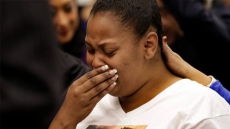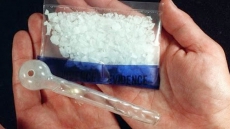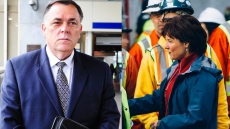VANCOUVER — When Stanley Cup rioters rained chaos onto Vancouver's downtown core in June 2011, holes were exposed in the capabilities of police trying to stop looting and arsons.
Communication between police was so bad that teams deploying tear gas accidentally dispersed crowds into streets being cleared by other squads. Radios were so faint in the din that many officers relayed messages on foot.
It took police over four hours to curb the destruction, which spurred more than three years of investigations and prompted about 1,260 criminal charges. Detectives collected 5,000 hours of digital video that was examined by 50 forensic analysts over two weeks at an Indianapolis laboratory.
But the effort, cost and injuries suffered that night could have been minimized had a high-tech solution been available.
A technology startup based in Vancouver gathered the findings from police as it pioneered cutting-edge software to address crises.
The CommandWear Systems' platform has been piloted and used by several police and paramedics agencies across Canada since the company was launched in June 2013.
"These organizations spend thousands of person-hours and millions of dollars investigating and trying to stitch together what happened. We record everything," said CEO Mike Morrow, who has worked with emergency responders for 26 years.
"What the situation looked like at any time, it's all there. They can play it back like a movie."
Instant replay is just one feature of the system that pairs a mobile app with a smartphone or smartwatch to receive vibrating text messages and keep track of each emergency responder.
Back at the command centre, the officer in charge can watch team members moving as colour-coded dots over a map on a tablet or laptop.
The system also records pictures and videos that can be posted to a timeline in real time.
"In the past we've been doing this with Velcro on a board — you lose a piece of Velcro and you've lost some personnel," said Rene Bernklau, president of the Canadian Association of Chemical, Biological, Radiological, Nuclear and Explosive Technicians.
But that's not an issue anymore with a system that captures everything digitally, added Bernklau, who teaches international medical teams how to respond to terrorism.
"You never lose anybody and you have full recall of the event," he said. "It's as simple as wearing a watch and having a cellphone. I think it will become the new norm."
In British Columbia, the RCMP has acquired CommandWear for their emergency response teams.
Morrow said the RCMP connected with his company because of two critical incidents: the shooting rampage through Moncton, N.B., in June 2014 that killed three police constables, and the fatal shooting of a Canadian soldier at the National War Memorial in Ottawa in October 2014.
"Now they're able to know where their team members are to communicate with them to keep them safe," Morrow said.
The system has been used by Vancouver police during summertime fireworks competitions, a tradition that draws 400,000 people to the city's beaches.
Ontario Provincial Police and the Toronto Police Service used it to co-ordinate and track their teams during the 2015 Pan Am Games.
The Ottawa Paramedic Service launched the system to comply with new worker-safety legislation, deploying the technology during July's Canada Day celebrations and the Ottawa marathon.
The B.C. Ambulance Service and B.C. Pavilion Corporation used it together during the Grey Cup. The ambulance service also harnessed its power to locate a lost child during the 2014 Santa Claus parade in Vancouver. Photos of the child were circulated immediately to staff throughout the enormous crowds.
An event medical services firm called Rockdoc Consulting co-ordinated about 100 staff members mingling with 100,000 concertgoers at the Pemberton Music Festival in July.
"Our dispatcher could see, 'Oh oh, I've got team Alpha and Bravo both at the medical tent. Well, I'd better bring Delta over from the far side to the middle so they can respond if there's another call,'" said RocDoc president and chief medical officer Samuel Gutman.
Privacy issues have been raised by watchdogs over police departments' growing use of body-mounted cameras for officers. Morrow acknowledged CommandWear takes tracking to the next level.
But he said the public should consider that they're already being tracked by Apple and Google through their smartphones.
"People need to realize there's a lot of surveillance around us, and at the end of the day that should make you feel safer. That should not scare you."
Bernklau said that as the technology improves further, it could be used in facilities from daycares centres to old-folks' homes.
"I think this type of technology is going to expand very rapidly," he said. "Everybody should be paying attention."





